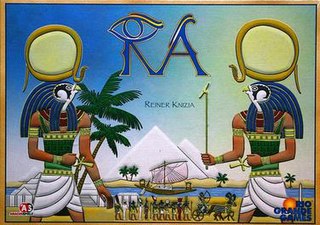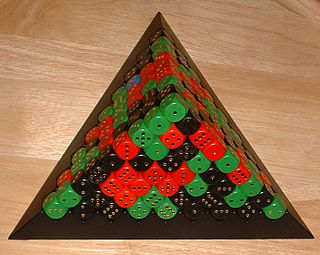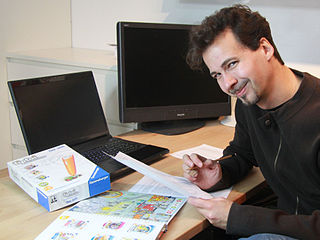
A Eurogame, also called a German-style board game, German game, or Euro-style game, is a class of tabletop games that generally has complex rules, indirect player interaction, and multiple ways to score points. Eurogames are sometimes contrasted with American-style board games, which generally involve more luck, conflict, and drama. They are usually less abstract than chess or Go, but more abstract than wargames. Likewise, they generally require more thought and planning than party games such as Pictionary or Trivial Pursuit.

Reiner Knizia is a prolific German-style board game designer. He was born in West Germany in 1957 and earned a doctorate in Mathematics from the University of Ulm before designing games full time. He is frequently included on lists of the greatest game designers of all time. Many of his hundreds of designs are considered modern classics, and many have won or been nominated for significant gaming awards, including the Spiel des Jahres and the Deutscher Spiele Preis. His notable designs include Amun-Re, Blue Moon City, Ingenious, Keltis, Lord of the Rings, Medici, Modern Art, Ra, Taj Mahal, Tigris and Euphrates, and Through the Desert. Many of his designs incorporate mathematical principles, such as his repeated use of auction mechanics.

El Grande is a German-style board game for 2-5 players, designed by Wolfgang Kramer and Richard Ulrich, and published in 1995 by Hans im Glück in German, by Rio Grande Games in English, and by 999 Games in Dutch. The game board represents renaissance-era Spain where the nobility fight for control of the nine regions. El Grande was praised for its area-control mechanism, and was awarded the Spiel des Jahres prize and the Deutscher Spiele Preis in 1996. Following its release, several expansions and an alternative version were published.

Kremlin is a board game satire of power struggles within the pre-glasnost Soviet Union government of the 1980s. The game takes its name from the Kremlin in Moscow, the location associated with the central Soviet government offices. The original German-language edition was designed by Urs Hostettler and released in 1986 by the Swiss board game company Fata Morgana Spiele under the name Kreml. An English translation of the game with slightly modified rules was published by Avalon Hill in 1988. Kremlin won a 1988 Origins Award for Best Boardgame Covering the Period 1900-1946.

Alhambra is a 2003 tile-based German-style board game designed by Dirk Henn. It was originally published in Germany by Queen Games in a language-interdependent version; an English-specific version was released in North America by the now-defunct Überplay. The game is a Muslim-themed update, set during the construction of the Alhambra palace in 14th century Granada, of the 1998 stock trading board game Stimmt So!, which in turn was an update of the 1992 mafia influence board game Al Capone; the original version was subsequently released as Alhambra: The Card Game. Upon its release, Alhambra won numerous awards, including the Spiel des Jahres award. Its success has led to the release of numerous expansion packs and spin-off games, and is becoming Queen Games' flagship franchise.

Wolfgang Kramer is a German board game designer.

Alan R. Moon is an author of board games, born in Southampton, England. He is generally considered to be one of the foremost designers of German-style board games. Many of his games can be seen as board game variations on the travelling salesman problem.

Ra is a board game for two to five players designed by Reiner Knizia and themed around Ra, the sun-god of Heliopolis in ancient Egyptian culture. It is one of three auction games designed by Knizia, the others being Medici and Modern Art.

Queen Games is a German publisher of tabletop games, based in Troisdorf and founded in 1992 by head Rajive Gupta, which specialises primarily in German-style, family-level games but has also published smaller numbers of both simpler, children's games and more complex, gamers' games.

Caylus is a strategy oriented, German-style board game designed by William Attia and independently published in 2005 by Ystari in France and England, and Rio Grande Games in North America. Caylus has a mix of building, producing, planning, and bargaining — without direct conflict or dice-rolling mechanics.
Entdecker is a German-style board game designed by Klaus Teuber and published in 1996 by Goldsieber in German. Although the game won 2nd prize in the Deutscher Spiele Preis in 1996, many gamers were disappointed with the game after the success of Teuber's previous game, The Settlers of Catan. An updated version, Die Neuen Entdecker, was published in 2001 by Kosmos; this version was published in English by Mayfair Games under the title Entdecker - Exploring New Horizons. This version of the game won the Essen Feather for that year.

Die Macher is a strategy board game published by Hans im Glück in 1986 that simulates a German general election.
To Court the King is a dice-based board game for 2–5 players designed by Tom Lehmann. It was published in German by Amigo Spiele as Um Krone und Kragen in 2006, and in English as To Court the King by Rio Grande Games. The basic mechanics of rolling and re-rolling dice have drawn comparisons to the game of Yahtzee.

The Game is a dice game designed by Reinhold Wittig. It was first published in Germany in 1979, without rules and under the German name Das Spiel.

Camel Up is a board game for two to eight players. It was designed by Steffen Bogen and illustrated by Dennis Lohausen, and published in 2014 by Pegasus Spiele. Players place bets on a camel race in the desert; the player who wins the most money is the winner of the game. Camel Up won the Spiel des Jahres in 2014.

Arno Steinwender is an Austrian board game designer and teacher. In his free time he develops board games, for which he has won several awards.
This list of board game awards is an index to articles that describe notable awards given to creators of board games. It also gives articles related to chess and go competitions.
Coup is a board game published in 1975 by F.X. Schmid.
Quacks & Co.: Quedlinburg Dash, also known as Quacks & Co., is a German children's racing game designed by Wolfgang Warsch and first published by Schmidt Spiele in 2022. It is a spin-off of the game The Quacks of Quedlinburg. Players take turns drawing coloured chips from a bag in order to move their animal along a racetrack and be the first to make it to Quedlinburg.













